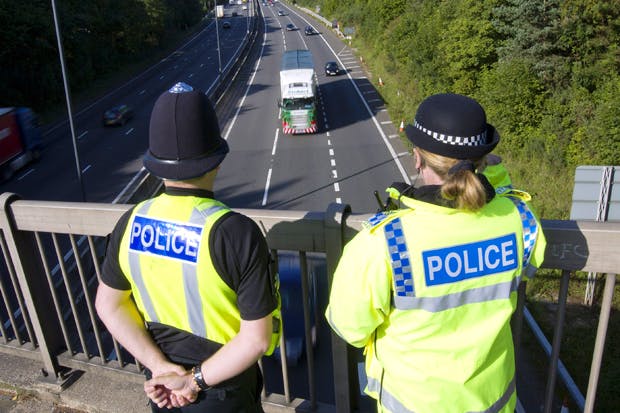It is nearly two years since the police were granted new powers to fine motorists for ‘hogging’ the middle lane of a motorway, but it’s only now that anyone has been convicted in court of this offence. A person driving a van at 60 mph on the M62 near Huddersfield has been fined £500 and given five penalty points for doggedly refusing to move out of the middle lane on to the inside one. Press reports of this judgment failed to say to what extent, if any, police have exercised their two-year-old right to give on-the-spot fines to drivers behaving in this way, but I have yet to hear or read of a case, and I would be surprised if there had ever been one. I drive at least twice a week along the M1 between London and Northampton, and I have yet to see the middle lane less than fully occupied by motorists showing no inclination to budge out of it, whatever the circumstance. The police would have to stop hundreds of vehicles and bring the already congested motorway to a complete standstill if they were to take their new powers at all seriously.
Here, it would seem, is an example of a completely pointless new rule that is all but impossible to implement. As far as I can see, it has changed nothing at all. The inside lane is still used only by lorries and excessively timid motorists, while everyone else swerves gaily about between the other two lanes. And why is it only the middle lane that drivers are forbidden to stay glued to? Drivers who won’t move out of the fast lane are far more annoying, because you can’t overtake them. The only way of venting your frustration is to undertake them, which of course you shouldn’t do, since it’s not only illegal but also dangerous. Undertaking is bad for everyone except undertakers.
Driving anywhere in Britain is no fun at all, but driving on the M1 is a particularly gruesome experience. The M1 is not only ugly and congested; it breeds road rage. This being so, it is surprisingly safe. It doesn’t feel as if it is. British drivers, outraged by the behaviour of others, often seem ready to go to their deaths to make their point rather than give way for their own safety. Yet there are many fewer accidents on motorways than there are on ordinary roads. That’s mainly because everybody’s going in the same direction, and has little to do with fear of the law. There seems to be hardly any of that, because there are seldom police around attempting to enforce the law. When the M1 is clear, few drivers observe the 70 mph speed limit. In the fast lane, the normal speed is usually somewhere between 80 and 90 mph, and even 100 mph is not unusual.
In any case, there are limits to what law enforcement can achieve in promoting road safety. Drunkenness is generally assumed to be a major cause of road accidents, but on motorways it’s responsible for only a tiny handful of them. Far more accidents — about 20 per cent of them — are caused by tiredness, about which little can be done. It is easy to frighten motorists into sobriety with the threat of the breathalyser, which can deprive them of their licences even if they are not involved in accidents at all. But you can’t criminalise sleepy driving as you can drunken driving. You can only charge a sleepy driver with being careless or dangerous after an accident has already taken place.
None of this should matter, however, when the fully automated driverless car arrives on the scene. Or so we must hope. Will the driverless car really know how to change lanes on the motorway when it is supposed to? Will it really know when to overtake and when not? It will be astonishing if it does. But we know already that it will never get drunk or sleepy or angry or frustrated. And if it turns out that it really can do all those other things as well, it will be an end to all our troubles. We will be able to sit in it drinking, sleeping, watching television, or whatever, without a care in the world. There will be no rules to break and no need for police to enforce them. What heaven!
Got something to add? Join the discussion and comment below.
Get 10 issues for just $10
Subscribe to The Spectator Australia today for the next 10 magazine issues, plus full online access, for just $10.













Comments
Don't miss out
Join the conversation with other Spectator Australia readers. Subscribe to leave a comment.
SUBSCRIBEAlready a subscriber? Log in